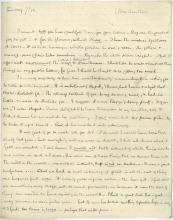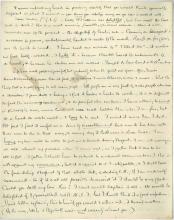BRACERS Record Detail for 18681
To access the original letter, email the Ready Division.
"I am very sorry to have been unintentionally inconsiderate in asking you to talk to Whitehead. It is unbelievably stupid, I know, but I never realized that Mrs. Whitehead disliked you. She always talked of you to me so very nicely, and had so little reason to dislike you. I suppose it was Roger's doing partly."
[Letter is not signed.]
Letter 40
BR TO OTTOLINE MORRELL, 14 JULY [1918]
BRACERS 18681. AL. Texas
Previous Brixton letter, BRACERS 131571; next letter, BRACERS 46926
Edited by K. Blackwell, A. Bone, N. Griffin and S. Turcon
<Brixton Prison>1
Sunday Jy. 14.
(More elsewhere)2
I cannot tell you how grateful I am for your letters3 — they are the greatest joy to get — and for the flowers, which I love. I love the mixture of colours and sorts — it is like having a whole garden in one’s room. The yellow and orange ones glow like sunshine — they make the whole place bright. — And I appreciate enormously the soap (which is delicious)a and strawberries. I don’t like to write about all these things in my public letters,4 for fear I should be thought to be getting too much.
I am very very sorry to have been unintentionally inconsiderate in asking you to talk to Whitehead. It is unbelievably stupid, I know, but I never realized that Mrs W.5 disliked you. She always talked of you to me so very nicely, and had so little reason to dislike you. I suppose it was Roger’s doing6 partly. Forgive me, I was stupid. I was delighted to leave the matter to my brother, only I didn’t know he would be willing. I only wanted one person spoken to, to take it up and run it.7 But it has worked out admirably.
It was good of you to write all you did. I do wish I could have been less aloof last year — but everything with me was in doubt, I did not know what I felt or wanted — I only knew I could not talk intimately while things inside me were in such chaos. This was one of those things that are stronger than all the will in the world — irresistible instincts, that insist on obedience. It was a great misfortune.… What we had in real intimacy of spirit is not the sort of thing one hopes to find again. It was of quite infinite value — the loss of it I feel still as something very tragic, not so much personally, as because it was the sort of thing one wishes to have existing in the world. I think a great deal that is good may remain to us in future years — but the war has killed something of poetic hope in me, and I feel too terre à terre8 — perhaps that will pass.
It never entered my head in praising vitality that you would think yourself deficient in what I meant — you know you vitalize every one you come in contact with.
I am reading Ld. G.L.G.9 — Lady B’s10 letters are delightful, but how could she love such a stick? She is a most amusing, lovable, generous woman. How it all reminds one of the present — the stupidity of leading men — Canning on Bonaparte’s accession to power,11 unbelievably brutal and wide of the mark. Thank you for giving me the book to read. I have read one version of Tête d’Or — it makes me feel half-witted. I hate it — because Claudel has not the rudiments of a heart, and because he strikes me as insane.12 I ought to have lived in the 18th century.
Life here is not positively painful, but gradually takes the spirit out of one. Yes, I miss divertissements, more than at first, and of course I miss tobacco, more and more. But the thing that is really trying is not seeing people — both people one is very fond of, and also people who are a stimulus. I grow dull and heavy. I find it harder and harder to work — it is so difficult to feel the necessary excitement, and so painful when one does. I have nothing to read in philosophy now, worse luck. I can read better than when I am free, but it is hard to write well. I long to be out. I mind it more than I did. At first I felt it useful as a time of recueillement but now it has done all there was to do in that way, and every day it lasts now is sheer loss. I am hoping my brother will be able to get me released during August. I am not worrying at all about my position when I come out, as I gather that is sure to be all right. I gather I shall have to submit to medical examination? This is not against my conscience, but it is against N.C.F. etiquette,13 and I shall lose the friendship and respect of that whole set, including C.A., if I am medically examined. So if it is at all possible to avoid it I should be very glad. Could you tell my brother this? I can’t well explain it all. He would be delighted if I quarrelled with N.C.F. but I should think it a great misfortune. Don’t bother explaining this to him if you would rather not, it doesn’t matter. (By the way, both he and Elizabeth write most warmly about you.)
- 1
[document] The letter was edited from a digital scan of the unsigned, handwritten, single-sheet original in the Morrell papers at the University of Texas at Austin.
- 2
(More elsewhere) I.e., Letter 38.
- 3
your letters Ottoline’s most recent letter was that of 8 July 1918 (marked “5th letter” by BR; BRACERS 114749); it was in reply to Letter 31.
- 4
my public letters I.e., BR’s “official letters”, the ones passing through the Brixton Governor.
- 5
Mrs W. Ottoline felt Evelyn Whitehead disliked her on account of Ottoline’s affair with BR, to which Ottoline also felt she was deeply opposed. There was also, perhaps, an element of jealousy because of Evelyn’s former importance in BR’s life (see Miranda Seymour, Ottoline Morrell: Life on the Grand Scale [London: Hodder & Stoughton, 1992], pp. 112–13).
- 6
Roger’s doing Roger Fry (1866–1934), art historian, critic and painter, whose portrait of BR, a friend since their Cambridge days, hangs in London’s National Portrait Gallery. Fry was also a confidante of Ottoline’s. From the start of BR’s affair with Ottoline, Fry, with whom she had had an earlier affair, was one of the chief sources of gossip about it (see Miranda Seymour, Ottoline Morrell: Life on the Grand Scale [London: Hodder & Stoughton, 1992], pp. 140–1).
- 7
take it up and run it I.e., the fellowship plan.
- 8
terre à terre Unimaginative.
- 9
Ld. G.L.G. “George Leveson Gower.” (BR’s note at BRACERS 119460.) Granville Leveson-Gower (1773–1846), whose correspondence Ottoline had recommended to BR, entered Parliament as a Tory M.P. in 1799, but his political allegiances (never fixed) slowly shifted after marrying in 1809 into one of the great Whig families, the Cavendishes (although not before he had fathered two illegitimate children by Lady Bessborough). He devoted most of his public life, not to politics, but to diplomacy, and held a number of ambassadorial appointments, including St. Petersburg and Paris. A younger son of the Marquess of Stafford, Leveson-Gower was elevated to the peerage in his own right as Viscount Granville in 1815 and received an earldom in 1833.
- 10
- 11
Canning on Bonaparte’s accession to power See Lord Granville, Private Correspondence, 1781–1821 (London: J. Murray, 1917), 1: 273. For the passage in question see Letter 41. Rising Tory politician George Canning (1770–1827) was a zealous opponent of revolutionary ideas and had been instrumental in establishing a publication, The Anti-Jacobin, to combat them. When he wrote to his friend and follower Lord Granville Leveson-Gower (19 Nov. 1799), Canning was serving as Under-Secretary of State for Foreign Affairs in the administration of William Pitt. As a senior statesman, at the Foreign Office (1822–27) then (for the last four months of his life) as Prime Minister, Canning tempered the reactionary tendencies he had exhibited early in his career. Indeed, he gained something of a liberal reputation for supporting independence movements in the Spanish Americas, backing the Greek revolt against Ottoman rule and favouring a relaxation of the Corn Laws.
- 12
Tête d’Or ... I hate it ... Claudel ... insane The French playwright and poet Paul Claudel (1868–1955) was six times a nominee for the Nobel Prize. A Catholic conservative deeply antagonistic to the anti-clericalism of the Third Republic, he nevertheless served it as a diplomat in a succession of senior postings overseas. In his early verse drama, Tête d’or, a violent, allegorical tale drenched in religious symbolism, the hero triumphs over the world but fails to find satisfaction or peace. The action plays out a conflict between the demands of the world and the demands of religion. Not surprisingly, the latter win. And it is not surprising either, given Claudel’s Catholicism and the fact that his chief literary influences were Rimbaud and symbolism, that BR hated it. The surprise is that BR had already read it. The play appeared in at least three versions. The first, in 1890, was published anonymously in a very limited edition. It is not known which version Ottoline sent him or which BR had read. She actually shared his disdain for the work, reminding him late in July (BRACERS 114751) that “it was only sent for other reasons” (i.e., for the concealment of smuggled letters).
- 13
medical examination … against N.C.F. etiquette A circular issued by the No-Conscription Fellowship in May 1916 advised C.O.s to “decline to sign any document, to accept any army pay, to undergo medical examination [italics added], to put on khaki, or to carry out any instruction to drill” (quoted in Thomas C. Kennedy, The Hound of Conscience: a History of the No-Conscription Fellowship, 1914–1919 [Fayetteville: U. of Arkansas P., 1981], p. 136).
- a
(which is delicious) Inserted.


